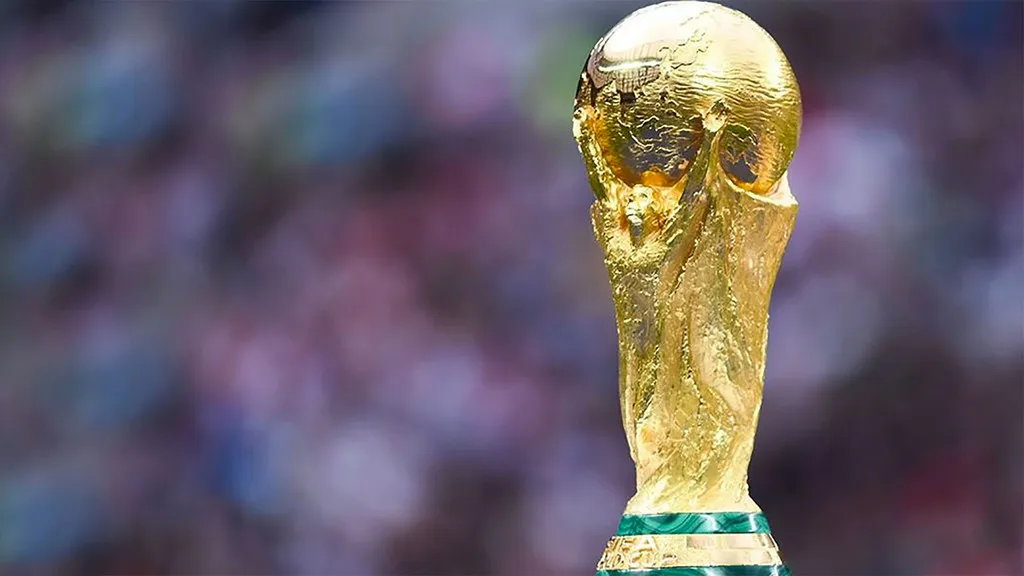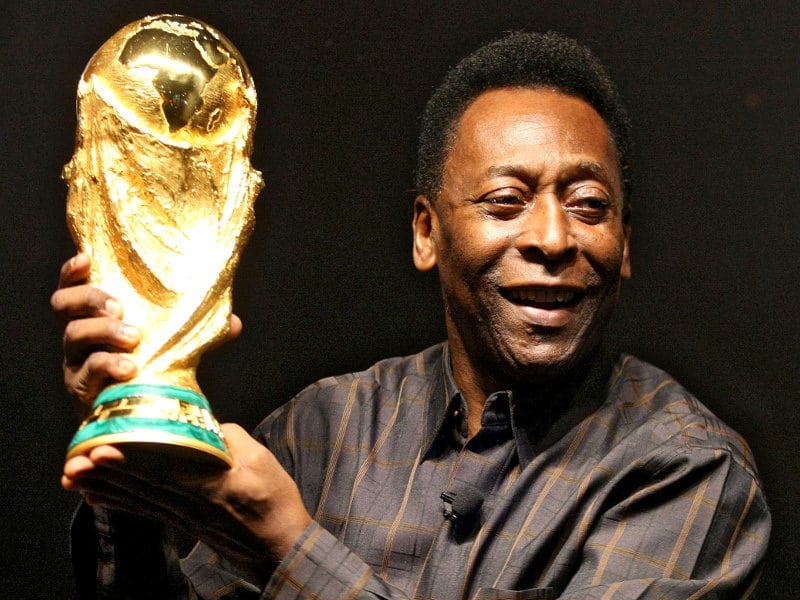
Is it finally Africa’s turn to win the World Cup?

Pele‘s infamous African World Cup prediction has long passed its due date, but it’s still trotted out ahead of every FIFA World Cup as the continent still awaits its maiden global title.
“An African nation will win the World Cup before the year 2000,” Pele declared in 1977, somewhat ambitiously in light of Zaire’s disastrous campaign — and 9-0 hammering by Yugoslavia — at the 1974 tournament.
Things haven’t quite been that bad since, but there’s been precious little in the way of tangible African World Cup improvement. Cameroon‘s run to the 1990 quarterfinal remains Africa’s high watermark, emulated by Senegal (2002) and Ghana (2010), but never surpassed.
Pele even extended his prediction to 2010, but this too proved to be in vain.
In fact, the continent’s collective performances have arguably deteriorated in recent decades, with the 2018 tournament the first since 1982 — when Africa only had two participants — where none reached the knockouts.
In the 80s, across two tournaments, 25 percent of Africa’s World Cup participants reached the knockouts, this peaked at 33 percent across three tournaments — and 10 participants — across the 90s.
In the 2000s, again across 10 participants and two tournaments, only 20 percent of teams reached the knockouts, while the last 16 participants — across the last three editions — registered a 25 percent success rate of progression.
Africa’s teams have collectively won three group games in each tournament since 1998, a 20-percent win-rate which dropped to 16.6 percent in 2010 when Africa had six representatives rather than five.
Coaching instability and inappropriate managerial appointments, with African teams too often denied the consistency, have denied teams the familiarity or the serenity that comes with managerial stability.
Some of Africa’s finest sides have been hamstrung by last-minute coaching reshuffles — think Nigeria parting ways with Philippe Troussier before appointing Bora Milutinovic only six months before the 1998 World Cup — or ill-fitting managerial appointments — think the Ivory Coast tasking Sabri Lamouchi, who had no prior coaching experience, to oversee their Golden Generation in 2012.
The Super Eagles’ appointment of Lars Lagerback and the Ivorians’ appointment of Sven-Goran Eriksson — four and three months respectively before the 2010 World Cup — would straddle both categories.
Too often talented and successful sides have found themselves lumbered with new managers and attempting to learn new approaches on the eve of the World Cup, with FAs keen to appease local hunger for a big name, high profile coach and justify greater expenditure on a salary by appointing a foreigner.
“The coaches’ chances of success were limited by the fact that they often did not fully identify with African culture, mentality and lifestyle or knew too little about these actors,” read FIFA’s Technical Report in the aftermath of the 2010 World Cup.
All that being said…
This year, Africa’s quintet are in a unique position whereby all of the five are being overseen by local head coaches — the first time in history that’s happened for all of Africa’s World Cup-bound representatives.
Aliou Cisse has been Senegal coach since 2015, having previously earned his stripes with the U-23 team. During the last seven years, he’s cultivated a unified, family atmosphere, typically remaining loyal to players, while leaning on a tactical approach that plays to his team’s strengths.
He’s overseen progress — consecutive World Cup qualifications for the first time as well as a maiden Africa Cup of Nations title — and has experience of the tournament both as player and head coach. With Cisse, Senegal have continuity, stability and critically, a track record of success.
The other four head coaches were not in their current posts at the start of the year, with Rigobert Song and Otto Addo taking the reins of Cameroon and Ghana respectively ahead of the playoffs, and Walid Regragui and Jalel Kadri appointed by Morocco and Tunisia after qualification.
However, all of the four have had experience of coaching within the national structures before their appointment, and are familiar with the national pool at their disposal.
Similarly, they’ve all overseen a boost in morale after replacing unpopular predecessors; with Addo and Song enjoying particularly high reputations in their homeland after eliminating Nigeria and stunning Algeria respectively in the playoffs.
Regragui has revitalised the Atlas Lions at just the right time after replacing the deeply unpopular Vahid Halilhodzic, whose hardline approach and ostracising of prominent players had not gone down well.
Economic disadvantages, inadequate logistics, corruption and mismanagement, and limited infrastructure have also served to restrict progress, as have the frequent financial disagreements that have undermined African teams’ performances.
Both Ghana and Cameroon imploded, against a backdrop of bonus disputes, in 2014, where Nigeria also boycotted training ahead of their Last 16 meeting with France, as Togo had threatened to in 2006. It remains to be seen whether such problems will again emerge in Qatar.
Potential contenders have also struggled to deal with menacing group stage draws as well as ill-timed injuries to key players.
Including Sadio Mane this year, the reigning African Footballer of the Year has been injured ahead of the World Cup in 2010, 2018 and 2022. Didier Drogba and Mohamed Salah did manage to take to the field, but both were shadows of themselves, while for Mane, who finished second in the Ballon d’Or only last month, there will be no fairytale comeback.
Who are the World Cup favourites?
Gab Marcotti and Julien Laurens pick their favourites to win the World Cup in Qatar.
Africa’s World Cup-bound teams have largely arrived at the tournament unscathed, with the glaring exception of Mane, whose absence must necessitate a recalibration of Senegal’s prospects, and Ghana, who are without both of their primary goalkeepers and their first choice defensive midfielder due to injury.
The nation’s president Nana Akufo-Addo appears unfazed, recently claiming that Pele “had Ghana in mind” when he made his bold 1977 prediction.
This year, none of the continent’s sides can truly claim to have been drawn in a particularly heinous, as has been the case in the past. Drogba’s Ivory Coast had to contend with both Argentina and the Netherlands in 2006, and both Brazil and Portugal in 2010. Despite their wealth of talent, the Elephants were unable to advance.
In 2002, Nigeria met Argentina, England and Sweden in Round One, Ghana met Germany, Portugal and the United States in 2014, while Morocco faced both Spain and Portugal in Russia; all three failed to progress.
Changes in the way World Cup draws are conducted since 2018 have reduced the chances of disproportionately tough groups, although Nigeria still found themselves up against both Argentina and eventual finalists Croatia in 2018.
Based on the FIFA World Rankings, Cameroon have the toughest group of the African sides in 2022, with World Cup favourites Brazil the most ominous threat. Switzerland are ranked 15th in the world, while Serbia are just outside the world’s top 20.
Ghana and Morocco are up against it after being pitted against Uruguay and Portugal and Croatia and Belgium respectively, but each might be quietly confident that their vitality and youth — the Black Stars are the youngest squad in the tournament — can upset teams who are reliant on some of the oldest players in the competition and risk having ageing legs at both ends of the pitch.
James Olley recaps a remarkable speech from FIFA president Gianni Infantino, in which he called out the “hypocrisy” of nations criticising Qatar.
Then there’s Senegal, who have comfortably the most appetising assignment of Africa’s five teams. As Sunday’s opener demonstrated, Qatar appear outmatched as hosts and shouldn’t be a match for the African champions, while Ecuador — ranked 44th in the world — will find the going much tougher against the Teranga Lions.
Senegal’s opener against the Netherlands, ranked eighth in the world, is perhaps the toughest single fixture of Cisse’s tenure, but the West Africans will still back themselves to progress to the knockouts.
Here, however, is where the loss of Mane, could thwart their attempts to emulate the glorious generation of 2002 or even break new ground for African competitors.
What this Senegal team are evidence of, however, is how qualification and success at the grandest stage of all can leave a legacy which benefits future generations.
The Teranga Lions may have failed to immediately build on their run to the 2002 quarterfinal, not returning to the World Cup until 2018, but the side that have now qualified for back-to-back editions were inspired by the achievements of the heroes of their youth, imbuing a new generation with a desire to emulate the feat of Papa Bouba Diop, El Hadji Diouf, Salif Diao et al.
“The generation of 2002 is a reference for them,” Cisse told ESPN earlier this year. “Many of our players followed us, and some even told me they were in the bus that ran behind our bus.
“It’s moving, that they have these reference points, it really touches me.”
The legacies of past international successes for both Senegal and even Ghana are starting to show on the teams’ fortunes today, and could prove a valuable source of sustenance as they look to break new ground in Qatar.
What all five teams have done successfully and effectively — a trend of this year’s African contingent more than ever before – is to integrate players from their broad diasporas into their World Cup squads.
Each of the five lean heavily on key players born and raised outside of Africa, with the likes of Kalidou Koulibaly and Edouard Mendy, Inaki Williams and Eric Maxim Choupo-Moting, Acrhaf Hakimi and Hakim Ziyech all bring the learnings and experiences of their specific routes to the top to bear on the national side.
Even without Mane, there’s no shortage of star power and Champions League experience in at least four of the continent’s five representatives, while Africa’s players are graduating from the top academies and working with the finest coaches like never before.
If the head coaches can continue to strike a blend between the homegrown talent and the diaspora stars, if they can continue to foster environments where connections can be established between players who have never lived inside a country and the nations they’re now representing, then Africa’s World Cup challenge can be stronger and richer than in the past.
France have won two World Cups while incorporating key stars born in Africa or born of African parents, African teams are starting to ensure that football’s globalization works for them too.
“An African team must win the World Cup in the near future,” CAF President Dr Patrice Motsepe said last year.
Win it? Probably not [sorry, Pele…] but even without Mane, there’s reason for cautious optimism that Africa’s 2022 representatives can at least improve the continent’s fortunes after 2018’s First Round whitewash.
source | ESPN
